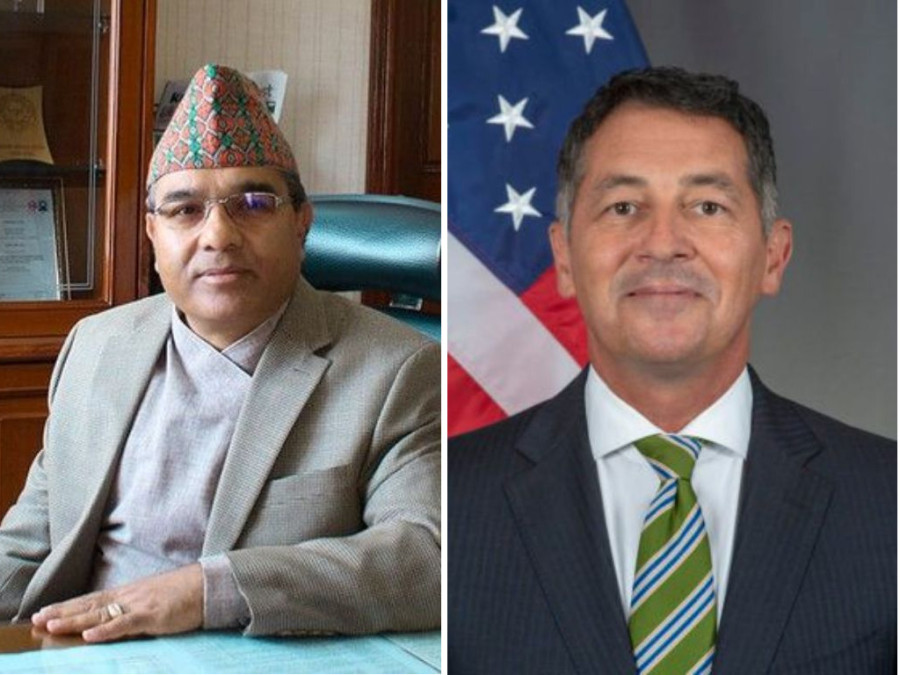Politics
US Embassy officials meet with foreign secretary over Chinese statement about Dahal’s ‘disapproval’ of Indo-Pacific Strategy
Dahal spoke on behalf of the party, not the government, according to a Nepal Communist Party leader.
Anil Giri
US Ambassador Randy Berry met with Foreign Secretary Shankar Das Bairagi on Thursday to discuss a statement released by the Chinese Foreign Ministry that said ruling party Co-chair Pushpa Kamal Dahal “disapproved” of the US-led Indo-Pacific Strategy.
Dahal’s assertion, during his meeting with Chinese State Councillor and Foreign Minister Wang Yi on Tuesday, that Nepal does not support the Washington-led Indo-Pacific Strategy had prompted the US Embassy in Kathmandu to seek a clarification from the Ministry of Foreign Affairs.
While Foreign Ministry officials were tight-lipped over the contents of Thursday’s conversation, they confirmed to the Post that Berry had reached the Office of the Foreign Secretary with his newly appointed Deputy Chief of Mission Manuel Micaller.
The meeting introduced Micaller to Bairagi and also provided a pretext for the US officials to inquire after the Chinese Foreign Ministry’s statement. It is unclear how Bairagi responded to the US officials’ queries in the closed-door meeting.
An official at the Foreign Ministry told the Post that Nepal’s position on the Belt & Road Initiative and the Indo-Pacific Strategy was made clear by Minister for Communication and Information Technology Gokul Baskota at a press conference on Thursday.
Responding to a question, Baskota said that there has been no shift in Nepal's position on its neighbours and other friendly nations and its conduct with them remains the same.
“The government is well aware [of its conduct] when it comes to Nepal's relations with friendly nations,” said Baskota. “Be it [the] Indo-Pacific [Strategy], BRI or any other issue, as a sovereign country, we have always been mindful of our conduct with neighbours and friendly nations. There has been neither any change nor any deviation in our stated position(s).”
Baskota, however, failed to clarify Nepal’s position on the Indo-Pacific Strategy, something foreign policy analysts and experts have long wondered about.
Nepal’s inclusion in the US-led Indo-Pacific Strategy came to light when Foreign Minister Pradeep Gyawali travelled to Washington, DC in December and held talks with the US Secretary of State Mike Pompeo. The two leaders reportedly discussed Washington’s Asia policy, also known as the Indo-Pacific Strategy, and Nepal’s key role in a free and open Indo-Pacific.
Gyawali, however, later refuted a US State Department statement that said Nepal is part of the larger US-led initiative. Holding a press conference days after returning from the US, Gyawali told media persons that though Nepal’s role in the Indo-Pacific region was discussed during his meeting with Pompeo, they did not speak in particular about the Indo-Pacific Strategy.
Earlier this week, a Chinese Foreign Ministry statement, released on Tuesday, quoted Dahal as saying that Nepal firmly adheres to the non-alignment policy, disapproves of the so-called ‘Indo-Pacific strategy’, and opposes any attempt to stop the development of China.
The Chinese statement and the subsequent clarification sought by the US embassy was also discussed in Parliament on Thursday.
Speaking at Parliament, ruling party lawmaker Pampha Bhusal urged the government to make its position clear on whether the US government had sought a clarification from the government or not. Bhusal herself sought clarification from the government on upcoming two training programmes between the Armed Police Force and US Army from November 4 to 15 in Nepal.
The US military has proposed high-altitude training in the Annapurna region and another swift water training in Chitwan and Kurintar.
“I would like to draw the attention of the government of Nepal to the training programmes and ask that we withdraw from it since the Indo-Pacific Strategy is in controversy,” Bhusal said. “Nepal has been pursuing an independent and non-aligned foreign policy and I urge the government to immediately stop the training programme between the Armed Police Force and the American Army.”
However, Bishnu Rijal, deputy chief of the ruling Nepal Communist Party’s Foreign Affairs Department, said that Dahal’s communication with the Chinese Foreign Minister was in line with the party’s recent political document.
“Dahal spoke on behalf of the party, not the government,” said Rijal. “In our political document, we have clearly stated that we have to be mindful of activities in the South China Sea, trouble around the Strait of Malacca, growing US military presence in the Indian and Pacific Oceans, and the China-led Belt and Road Initiative and its opposition by some countries.”
***
What do you think?
Dear reader, we’d like to hear from you. We regularly publish letters to the editor on contemporary issues or direct responses to something the Post has recently published. Please send your letters to [email protected] with "Letter to the Editor" in the subject line. Please include your name, location, and a contact address so one of our editors can reach out to you.




 16.12°C Kathmandu
16.12°C Kathmandu















